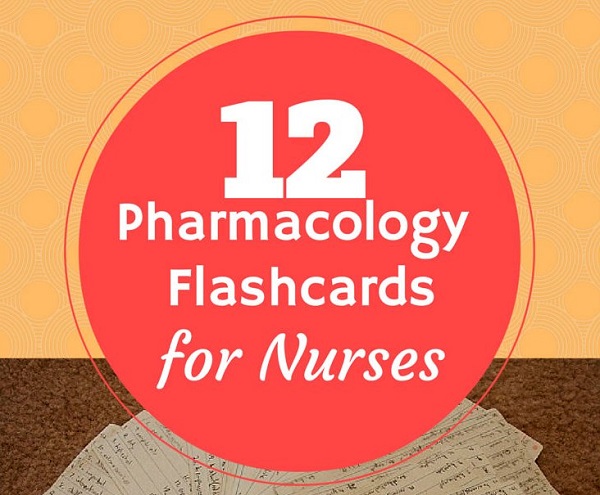Nurses need to learn pharmacology in order to administer medications well, know why the patient is getting the medication, how the medication works, how to administer it, and what side effects to expect.
Also Read: A Nurse’s Ultimate Guide to Accurate Drug Dosage Calculations
Here are 12 informative and enlightening Pharmacology flashcards that nurses will find very handy:
1. Drug Categories – An Overview.
These flashcards present different drug categories which affect the immune system; pain and inflammation; the nervous system; cardiovascular system; blood; respiratory system; fluid, electrolytes, minerals and the renal system; digestive system and nutrition; endocrine system; reproductive system.
This set of flashcards also features the standard conversion factors as well as information about subcutaneous and intramuscular injections, when to use them and their maximal volume.
2. Anti-infectives.
Anti-infectives are medications that eradicate infectious agents or stop them from spreading. This set of flashcards will educate you about their expected actions, therapeutic uses, adverse effects, contraindications, interactions and other information.
The anti-infective drugs that are included are Penicillins, Cephalosporins, Carbapenems, Monobactams, Tetracyclines, Bacteriostatic Inhibitors, Aminoglycosides, Urinary Tract Aseptics, Antimycobacterial, Anti-Hansen’s Disease, Antivirals, Fluoroquinolones and Antiprotozoals, among many others.
3. Immune system drugs.
The immune system is made up of different cells, tissues and organs that work together to protect the body. When the immune system is functioning well, it protects the body against bacterial and viral infections and even destroys foreign substances that invade the body. This set of flashcards offers information about vaccines and other drugs, as well as information on antihistamines and chemotherapy agents.
Also Read: Nursing Mnemonics & Tricks (Pharmacology)
4. Analgesics and anti-inflammatory drugs.
This set includes information about medications that relieve pain (analgesics) and inflammation (anti-inflammatory), and those that reduce platelet aggregation (salicylates and NSAIDs), among many others. It will give you new knowledge about analgesics and anti-inflammatory medicines, or simply refresh what you have learned in Nursing school.
5. Nervous system drugs.
This group of medications basically cures conditions concerning the brain, the peripheral nerves and the spinal cord, such as Alzheimer’s Disease, Attention Deficit Hyperactivity Disorder (ADHD), Carpal Tunnel Syndrome, Dementia, Tourette’s Syndrome, Multiple Sclerosis, Muscular Dystrophy, Parkinson’s Disease and strokes, among many others. It also discusses their uses, effects, precautions and interactions.
6. Cardiovascular system drugs.
These drugs are used to control or prevent certain heart conditions. The reason that many people take more than just one drug is because they may have numerous symptoms that need control at the same time. There are various categories of these medications, and knowing about them may be helpful, especially for nurses.
Also Read: Nursing Mnemonics & Acronyms (Cardiovascular System)
7. Drugs affecting the blood.
Blood disorders fall under various categories such as hemoglobinopathies, anemias, malignancies, coagulopathies, and decreased or increased number of cells. This set of flashcards offers information about drugs that may treat these blood disorders, their expected effects, side effects, and contraindications among other information.
8. Respiratory system drugs.
Our respiratory system is usually subjected to pollution, chemicals, dusts and other microorganisms that may cause problems such as airflow obstruction. This is where the medications discussed in these flashcards come in. These drugs help control respiratory conditions, if not totally eradicate foreign bodies that cause these illnesses.
9. Medications affecting fluids, electrolytes, minerals, and the renal system.
Electrolytes are everywhere in our body — blood, urine and body fluids. The goal is to maintain the right balance of electrolytes to support muscle action, blood chemistry and other functions.
Also Read: Nursing Mnemonics & Acronyms (Acid-Base, Fluids, & Electrolytes)
We get most of the electrolytes from food. Change in the body’s water level may increase or decrease some electrolytes. This must be corrected immediately to prevent problems like dehydration or hyperhydration.
10. Medications affecting digestion and nutrition.
Digestive disorders are usually relieved or prevented by maintaining a healthy lifestyle, but since people want a quicker way out of the illness, they prefer taking medications. This set of flashcards discuss categories of digestive drugs, their uses, side effects, contraindications and interactions.
11. Endocrine system drugs.
The endocrine system, which is in charge of most of our body processes like growth and development, is basically made up of hormones and glands. Too much or too little of any hormone may cause harm to the body.
One common disorder of the endocrine system is Diabetes Mellitus, wherein the pancreas cannot produce enough insulin (Type I) or the body is not able to respond to insulin at all (Type II). Medications for diabetes and other endocrine system disorders will be discussed in these flashcards.
12. Medications affecting the reproductive system.
The reproductive system is one of the most important systems in the body, as its purpose is to produce new life. Though most medications are designed to cure diseases, they can also cause problems with the reproductive system, such as infertility and sexual dysfunction. More details about drugs for the reproductive system are discussed in these flashcards.
Also Read: Nursing Mnemonics & Acronyms (Nursing Pharmacology)
About the Author: Mary Elizabeth Velarmino Francisco earned her Bachelor of Science in Nursing Degree from the Ateneo de Zamboanga University, Philippines. She is always happy to share her passion for writing and blogging. With coffee running through her veins, she enthusiastically battles each day, one article at a time.



















